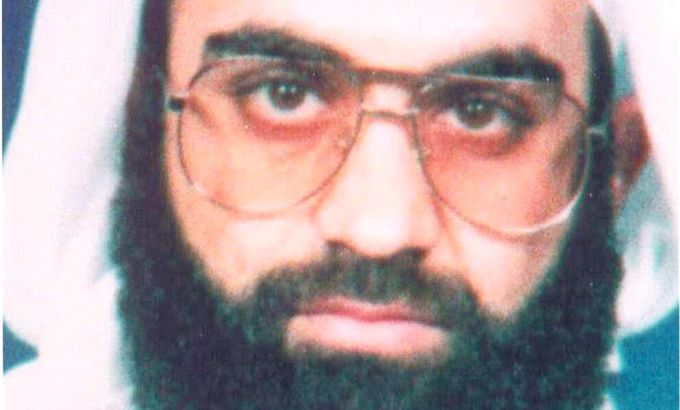Chaotic start to opening of 9/11 trial
Five men, including alleged mastermind Khalid Sheikh Mohammed, refuse to enter plea in US military court in Cuba.

Five men accused of planning the September 11, 2001 attacks on the United States have refused to enter a plea after appearing before a military court in Guantanamo Bay.
The defendants, including Khalid Sheikh Mohammed, who is accused of masterminding the attacks, faced a disorderly 13-hour arraignment on Saturday under heavy security at the US base in Cuba.
The five opted to plead neither innocent nor guilty, but rather to defer their plea to a later date.
The accused face charges that include terrorism and 2,976 counts of murder for their alleged roles planning and aiding the attacks by hijackers aboard four airliners which destroyed the World Trade Center in New York and damaged the US defence department headquarters at the Pentagon, near Washington DC.
In addition to Mohammed, a Kuwait-born Pakistani who was captured in 2003 and transferred to Guantanamo in 2006, four other men face trial over their alleged roles in the 2001 attacks.
They are Waleed bin Attash, Ramzi Binalshibh, Ali Abd al-Aziz Ali and Mustafa Ahmad al-Hawsawi. All five men could face the death penalty if convicted.
It was not until more than seven hours into the disrupted and prolonged hearing that prosecutors even began reading the charges against the men. It took prosecutors two-and-a-half hours to read the portion of the charge-sheet describing the hijackings, although they did not read the appendix listing the names of all 2,976 people who were killed.
Another hearing has been set for June 12.
The judge, Army Colonel James Pohl, said it would be at least a year before the trial started.
Defendants protest
As the arraignment got under way, the defendants removed their earphones and refused to listen to a translation of the judge’s questions.
Mohammed declined to answer the judge’s questions about whether he was satisfied with his US military and civilian lawyers, while lawyers for all defendants complained that the prisoners were prevented from wearing the civilian clothes of their choice
|
“You are going to kill us and say that we are committing suicide.” – Ramzi Binalshibh, defendant |
At one point, two of the men got up and prayed alongside their defence tables. Binalshibh then stood up and shouted at the judge: “You are going to kill us and say that we are committing suicide.”
“There were a lot of disruptions and objections and attempts to discuss motions throughout the morning session, which lasted about three-and-a-half hours,” said Al Jazeera’s Rosiland Jordan, reporting from Guantanamo.
“Defence lawyers were very keen to make it clear early on that they were not just going to follow procedure without questioning the process in the bargain.”
The detainees were largely unresponsive while the charges against them were being read out, sometimes listening, but at other times reading the Quran or speaking to each other or their lawyers.
Saturday’s hearing is the first time the five have been in court in nearly three-and-a-half years. US President Barack Obama put their previous tribunal on hold in a failed effort to move the case to civilian court.
Mohammed has mocked the tribunal and said in previous court appearances that he welcomed execution.
“The military commission that is trying Mohammed and his four co-defendants is itself extremely controversial,” our correspondent said.
“Military commissions have been used in US history, prior to this, but usually they involved people who were actually soldiers from another country’s military.
“These men were not acting on behalf of any specific state or nation, so there has been a lot of criticism about them being tried in this setting.”
Forced confessions
Steven Kay, an international criminal lawyer in London, told Al Jazeera Mohammed had been subjected to “waterboarding”, or simulated drowning, by US interrogators more than 180 times and that confessions extracted through torture would be disregarded.
|
|
“Statements obtained by coercion cannot be used as evidence. However, the laws do not say that evidence obtained by coercion is inadmissible,” he said.
“I’m afraid this whole business since George Bush [Obama’s predecessor] introduced the military trials has gone out of control.
“If the Americans had gone down the proper and orthodox path when dealing with these suspected terrorists, and provided a justice system that was coherent, rational and based upon sound principles, they would not be in the mess that they are in now.”
The trial is being broadcast on closed-circuit TV at selected locations for families of September 11 victims, survivors and emergency personnel who responded to the attack.
Dozens of journalists as well as relatives of September 11 victims are also attending the hearing.
Closed-circuit broadcast opposed
Lawyers for some defendants opposed the closed-circuit broadcast on the grounds that the proceedings should be open to anyone to see, not just broadcast by closed-circuit TV at certain locations.
“We want it more transparent and more open,” said Cheryl Bormann, a lawyer for defendant Waleed bin Attash. “We believe that the world needs to see what’s happening.”
This is the second time that the US has attempted to prosecute the five prisoners at Guantanamo.
Obama’s administration withdrew the charges and sought to move the case to a civilian court in the US as part of an effort to close the prison on the base in Cuba.
But the administration was forced to reverse course because of opposition in Congress and by New York City officials who said the case posed too great of a security threat.